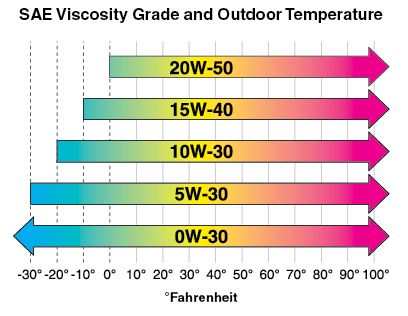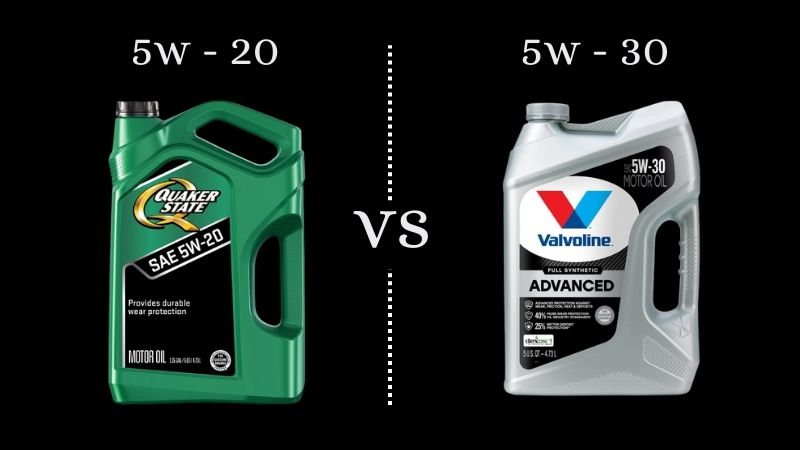Can I Use 5w30 Instead Of 5w20 In My Ford – Clear The Doubts In 2023!
As a Ford enthusiast, I was also confused between these two oils. So, come along with me as I share my adventure of research, hands-on testing, and exploration to find the ultimate answer to “Can I use 5w30 instead of 5w20 in my Ford?”
Yes, you can use 5W-30 instead of 5W-20 in your Ford vehicle but it all depends on you. Using different oils won’t cause engine failure but may impact performance. However, it’s advisable to consult your owner’s manual or a Ford dealership first.
Not only this, but there is a lot more that you need to know. Just stick with us till the end of the discussion and explore!
What Is The SAE Viscosity Rating System? – Understand The Basics First!

In simple terms, the Society of Automotive Engineers (SAE) developed the SAE code for standard engine oil to bring order and usefulness to the automotive industry.
This code primarily tells you how thick the oil is and whether it suits your vehicle’s temperature needs, ensuring safety and performance.
Let’s simplify and clarify what 5W-30 oil means:
- 5W-30 oil is thinner when you start the engine in cold weather.
- The “W” indicates it’s suitable for winter conditions.
- The “30” in warmer temperatures shows it’s thicker, though not excessively. A lower number means it’s thinner and causes less friction.
Factors You Must Consider When Choosing Between 5W30 And 5W20 – Take A Deep Analysis!
1. Engine Wear Is A Considerable Factor:
Using a different viscosity of oil can affect engine wear. Thicker oil, like 5W30, better protects high-mileage engines, reducing wear and tear. If I talk about the factors, I also consider the oil, which makes the engine run in its best condition.
For older Ford cars or ones that have travelled many miles, using 5W30 oil can be a smart decision. It helps reduce damage and ensures your engine stays healthy and runs longer.
2. Fuel Economy That You Can Afford:

Thinner oils, such as 5W20, are designed to improve fuel efficiency. Using 5W30 may lead to a slight decrease in gas mileage.
The difference in fuel economy between 5W20 and 5W30 may be minor, but it can accumulate over time, especially for frequent drivers or those with lengthy commutes.
Affordable oils are the top choice for everyone, just like me. However, 5w30 proves to be budget friendly for me.
Additionally, 5W20 performs better during cold start-ups, ensuring smoother ignition and preventing excess fuel consumption during these critical moments.
3. Temperature Conditions That Is Suitable:
Consider your local climate. Cold weather can make it challenging for thicker oil to flow properly, potentially causing startup issues. Conversely, hot climates may benefit from 5W30.
Certainly, let’s explain the potential benefits of using 5W30 engine oil in more detail.
3 Amazing Benefits Of Using 5W30 In Your Ford Car – Explore The Advantages!
1. Improved Engine Protection In Colder Climates:

When you’re in a colder climate, the viscosity of your engine oil becomes crucial. 5W30 oil has a lower “W” (winter) viscosity rating than 5W20, so it flows more easily at lower temperatures. This characteristic is especially beneficial during cold starts.
In my personal experience, when my car has been left in sub-zero temperatures overnight, I’ve found that opting for 5W30 engine oil has been a wise choice.
It’s remarkable how 5W30’s quick flow characteristics make a significant difference during those cold starts.
When I turn the ignition key, this oil flows readily, reaching all the critical engine parts without hesitation. This translates into tangible benefits for my vehicle.
2. Better High-Temperature Stability:
For me, the 5W30 has proven to be a lifesaver for my engine when it comes to handling high temperatures. Its impressive ability to maintain viscosity, even when things get extremely hot under the hood, is what makes it stand out. I’ve noticed that when engine oil thins due to heat, it’s like leaving my car’s engine at risk.
What’s remarkable about 5W30 is that it not only performs admirably in cold weather but also excels in high-temperature conditions.
Its 30-weight rating is a clear indicator that it effectively preserves viscosity even when temperatures rise significantly.
This stability is absolutely crucial because, from my experience, modern engines can generate a substantial amount of heat during their operation.
3. Enhanced Fuel Economy in Some Situations:
Even though it might sound a bit surprising, using 5W30 engine oil can result in improved fuel efficiency, depending on how and where you drive.
The main idea here is that thicker oil, such as 5W30, can reduce the rubbing and resistance inside your engine.
I feel that when there’s less friction, my engine doesn’t need to work hard. This can lead to better fuel efficiency, especially during highway driving or long journeys.
From my personal experience, the impact of using 5W30 on fuel efficiency might not always be particularly noticeable. Today’s engines are uniquely crafted, featuring precise tolerances, and various elements can sway fuel economy.
Now, after discussing the advantages, let’s cover these two oils’ differences.
After reading the audience discussion, you can also explore the data from the forum-based websites.
What Happens When You Use 5w30 On A 5w20 Engine – Focus On It!

Don’t worry; your engine will still run just fine. However, using a different type of oil than what’s recommended in your owner’s manual can void your car’s warranty. If you’re not too concerned about the warranty, then you’re good to proceed.
It’s essential to understand that modern cars rely heavily on computer systems. When you use a different oil, the car’s computer may detect it and send incorrect signals to other components. This can result in the check engine light coming on, or you might start noticing unusual signs.
Moreover, if you switch to a new type of oil, it’s best to stick with it for a while. Avoid using different oils at each oil change, as this could potentially lead to a severe engine breakdown.
Motor oils contain specific additives designed to benefit the engine, and if you keep mixing or switching oils, your engine won’t receive the necessary additives. This constant change can cause significant damage over time.
Difference Between The 5W30 And 5W20 – A Quick Look To Both!
| Aspect | 5W30 Oil | 5W20 Oil |
| Cold Temperature Flow | Similar | Similar |
| High-Temperature Stability | Better | More Likely To Thin |
| Brand/Store Variation | None | None |
| Warranty Concerns | Occasional Concern | Occasional Concern |
| Risk of Engine Damage | Low | Low |
Can I Mix 5w20 And 5w30? – Learn About The Possibilities!

It’s best not to mix these oils. While your engine may not show problems right away, it’s a good idea to drain and replace the oil as soon as possible for the sake of your engine’s lifespan. If it takes a while to get the right oil, here’s what you can do:
- Drive at a lower speed.
- Try to keep the engine from getting too hot.
- If the temperature gauge goes into the red zone, pull over, let the engine cool down, and then continue driving.
- If the engine keeps overheating, it’s best to call for roadside assistance.
And Here You Go! By reading the above discussion on “Can I use 5w30 instead of 5w20?” You can easily select the best oil for your Ford car. You can also read the audience discussion on this forum-based community website.
Frequently Asked Questions:
1. What can I use instead of 5W20?
Usually, 0W-20 can substitute for 5W-20. However, there might be one particular situation where you should avoid using 0W-20: if your vehicle is still under warranty.
2. Can I use 5w30 instead of 5w20 in my Toyota?
Yes, you can use this oil in all Toyota engines because it is recommended. This oil type is a common and suitable choice due to its compatibility and performance characteristics. Checking your specific Toyota model’s owner’s manual is always a good practice.
3. Will using 5W30 instead of 5W20 void my Ford’s warranty?
Using a different oil viscosity than recommended may impact your warranty. It’s advisable to consult your dealership and consider their guidance.
4. Can I Use 5w30 Instead Of 5w20 In My Ford F150?
Yes, both of these oils are quite similar and have nearly the same thickness rating. However, 5W30 is a bit thicker and tends to perform better than 5W20 in hotter temperatures. So, to some extent, it should be a consideration.
Conclusion:
Summing up the whole discussion,
Yes, you can typically use 5w30 instead of 5w20 in your Ford. Still, it’s essential to check your Ford’s recommendations and consider factors like climate and vehicle age for optimal performance.
It is possible in many cases, but it’s essential to consider factors like your vehicle’s age, manufacturer recommendations, and local climate. Always consult your owner’s manual and, if necessary, seek advice from a Ford dealership to make an informed choice.
